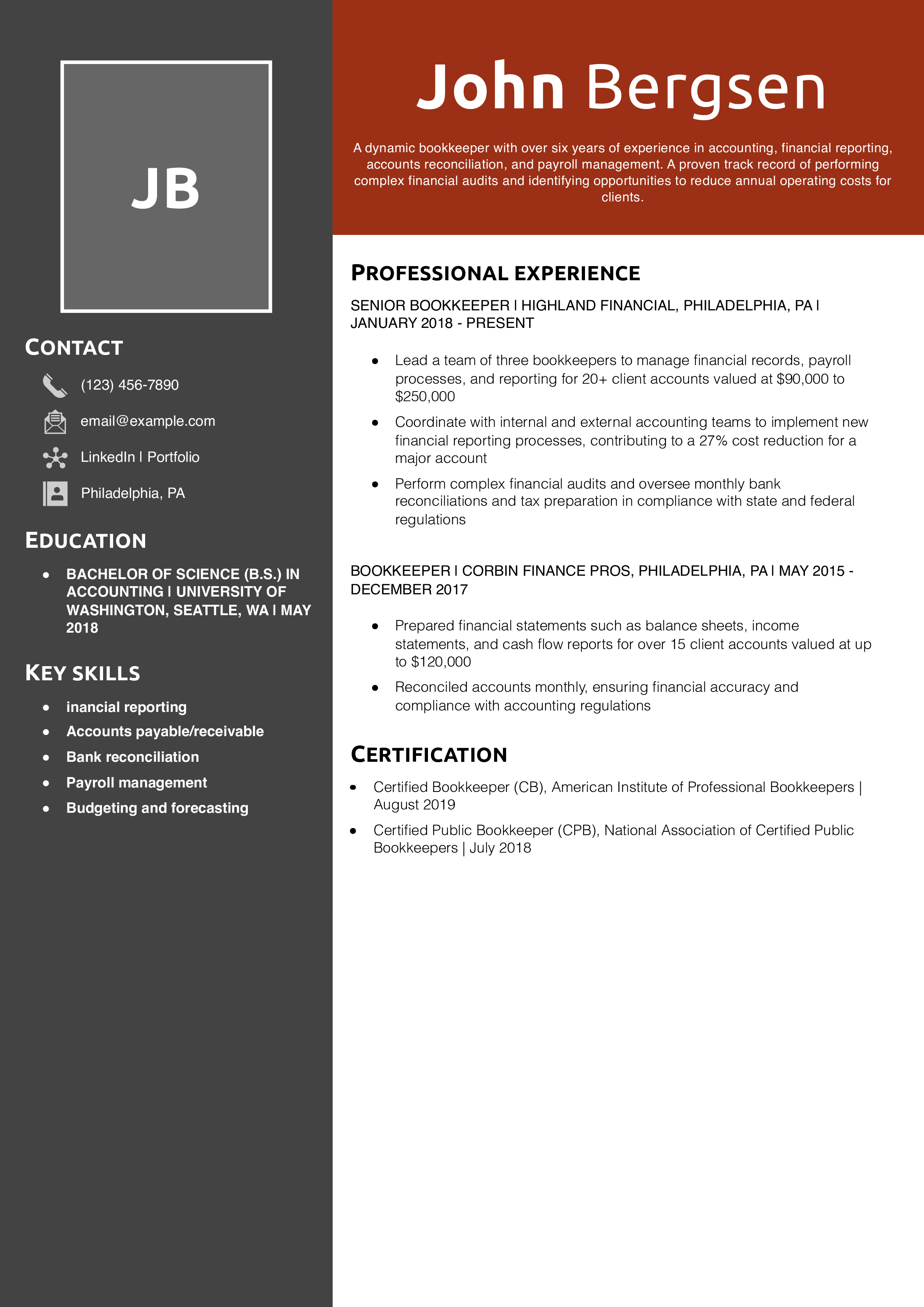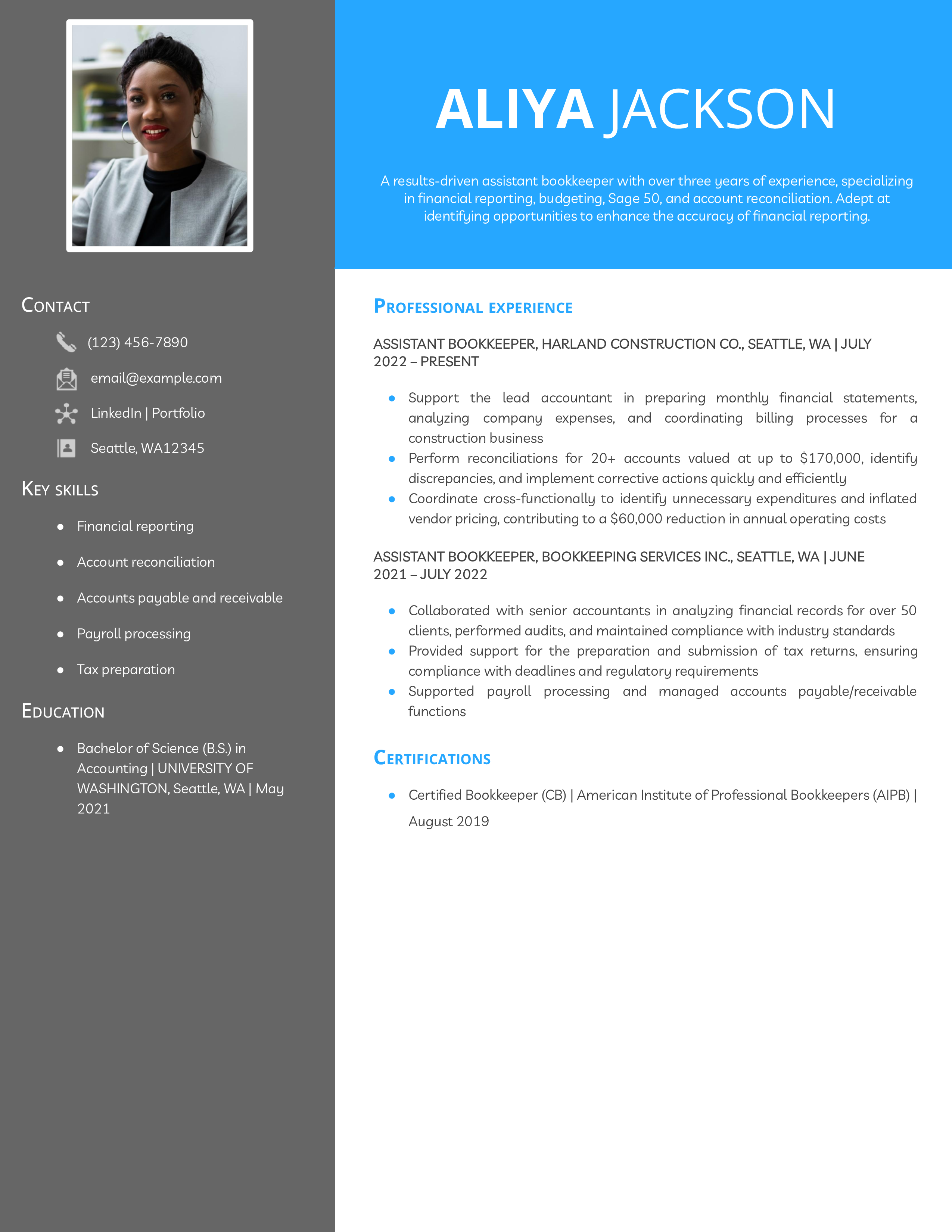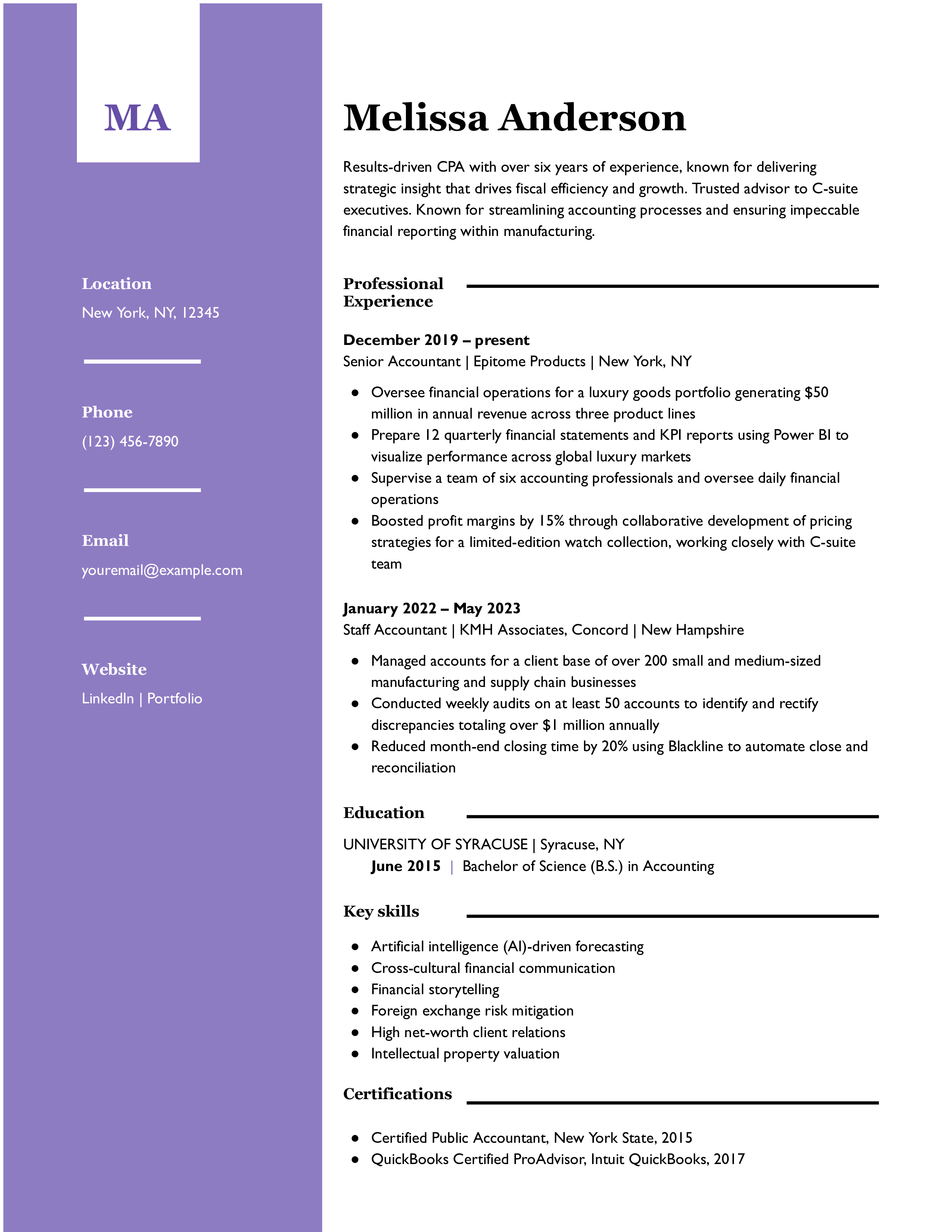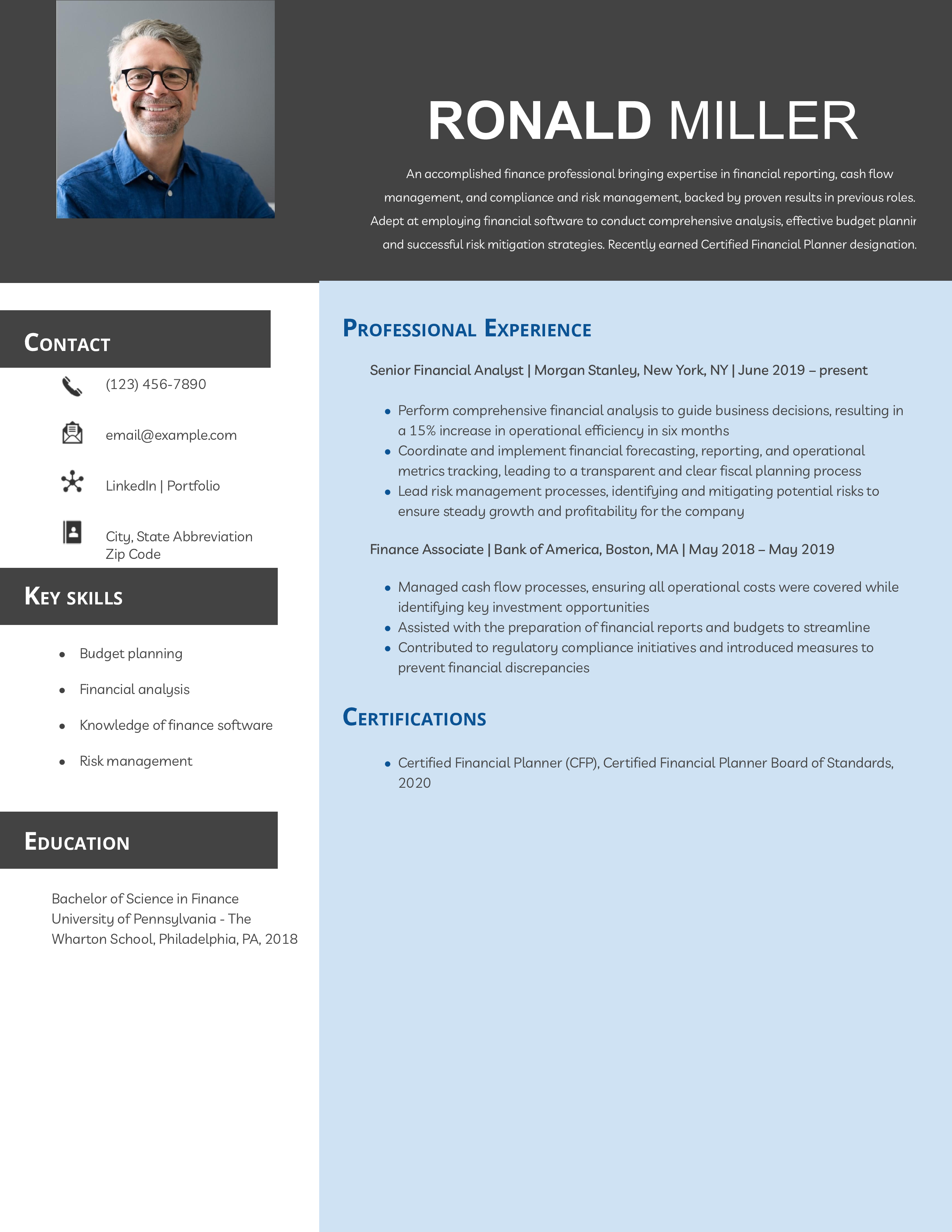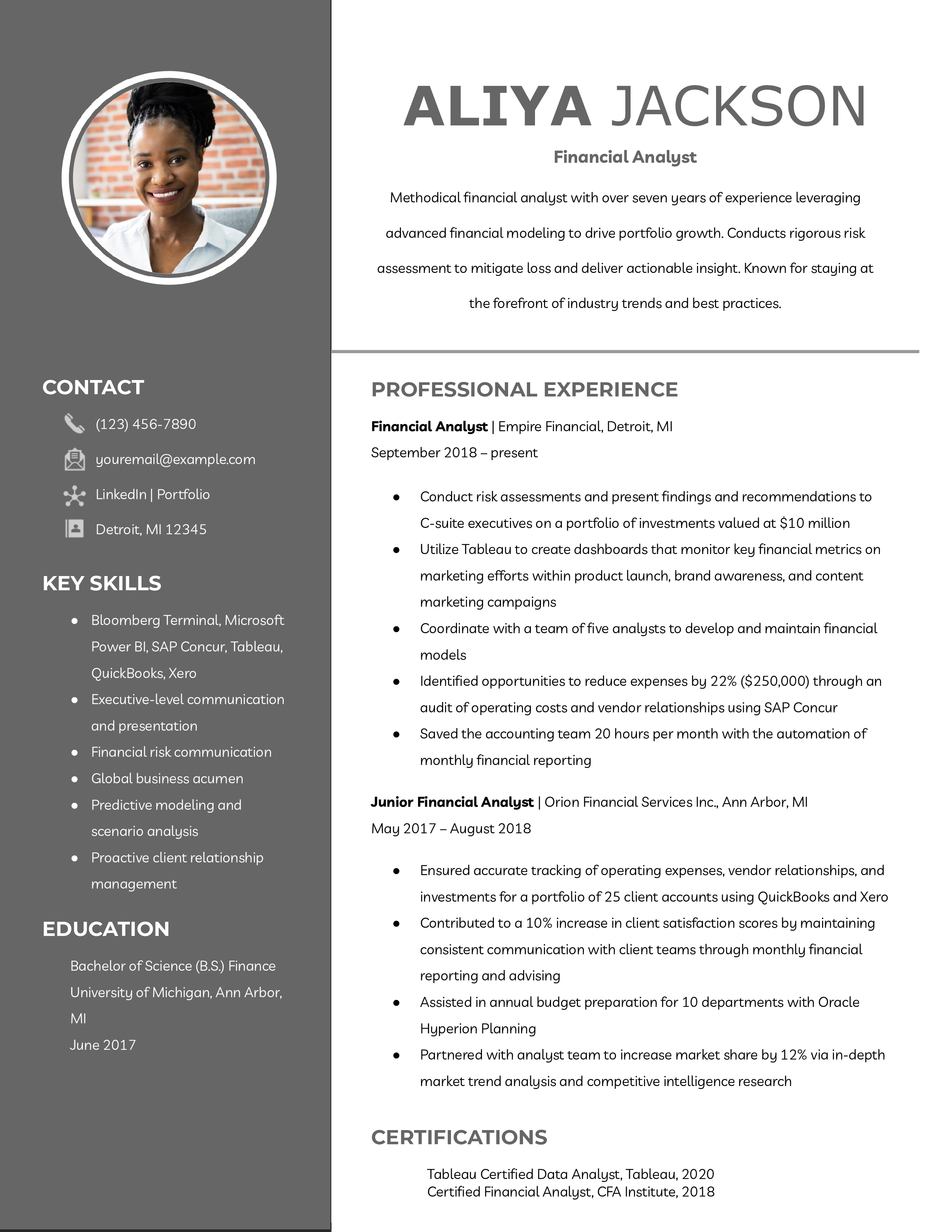Bookkeeper Resume Templates and Examples (Download in App)
- Bookkeeper
- Beginner Bookkeeper
- Assistant Bookkeeper
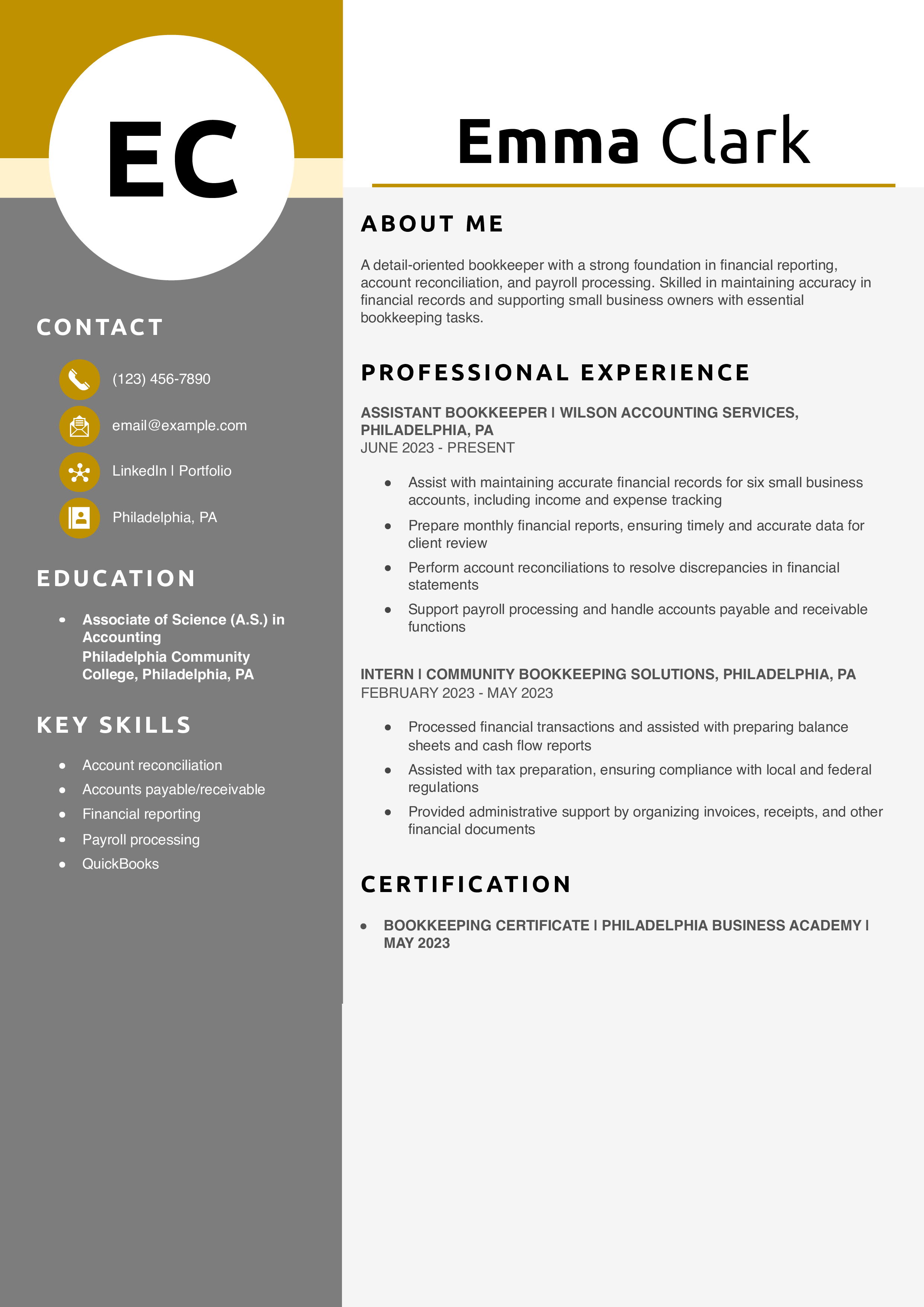
Experienced Bookkeeper Resume Example
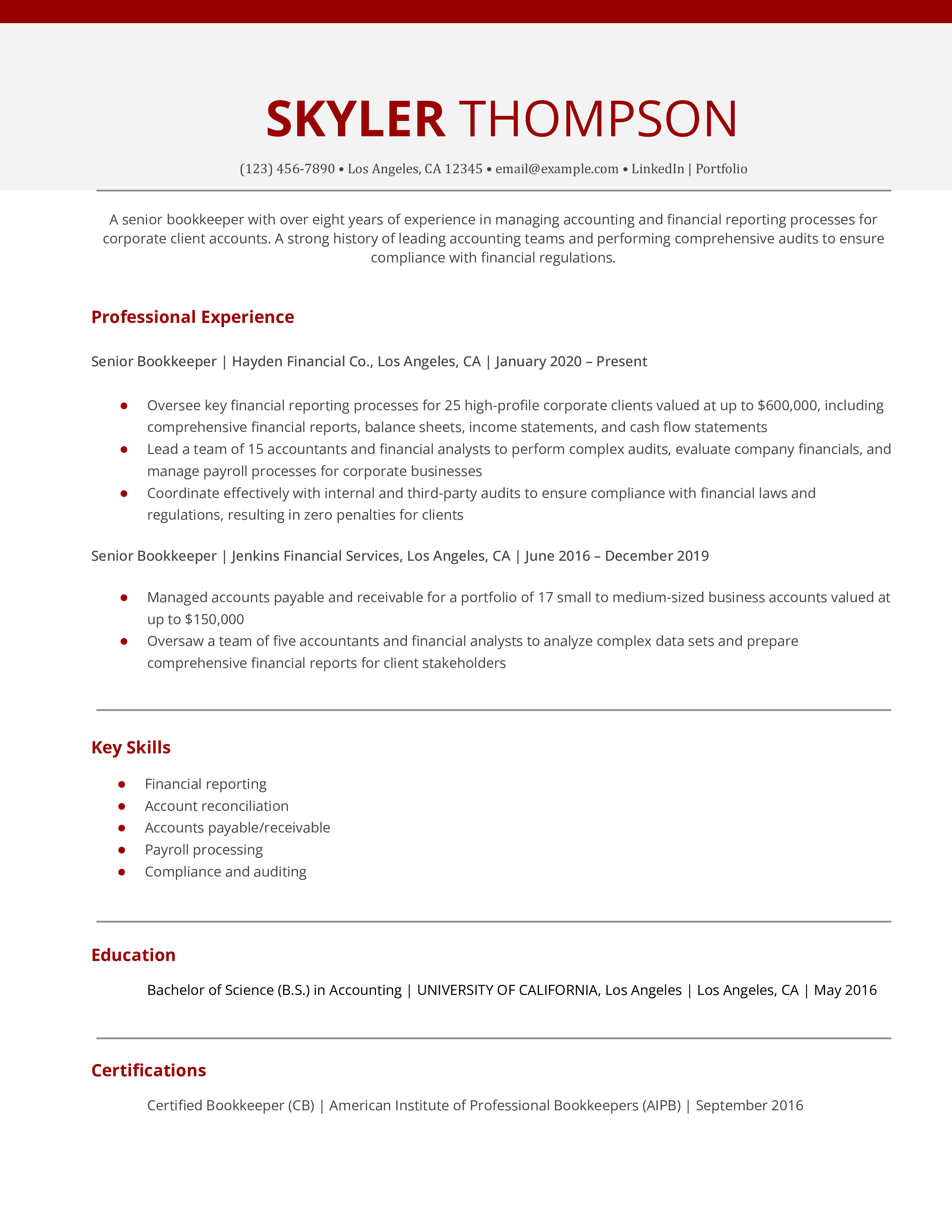
As a bookkeeper, you play an integral role in maintaining the financial health of businesses through rigorous reporting and analysis. To make a lasting impression on the hiring manager, you need a results-driven resume that demonstrates your proven track record of uncovering value and reducing expenses for previous employers. In this guide, we’ll walk you through each step of the writing process to help you build an eye-catching bookkeeper resume and land your next big job opportunity.
Key takeaways:
- Emphasize your financial expertise: Demonstrate your financial acumen in the form of career accomplishments, such as enhancing financial reporting and improving billing procedures
- Detail quantifiable achievements: Use specific numbers and results to showcase your impact in previous bookkeeping roles, such as improvements in reconciliation accuracy and cost reduction initiatives
- Use keywords for ATS: Incorporate relevant bookkeeping skills and keywords from job descriptions to ensure your resume passes through Applicant Tracking Systems (ATS) and reaches hiring managers
How To Write a Bookkeeper Resume Example
The first step in writing your bookkeeper resume is to identify the ideal layout for your content. Opt for a format that allows the hiring manager to easily navigate your qualifications, work experience, skills, and education. Your resume should always include the following sections:
- Contact information
- Profile
- Key skills
- Professional experience
- Education and certifications
1. Share your contact information
Provide your full name, phone number, email address, location, and a link to your online professional profile. Be sure your contact information is current so potential employers can reach out to you for an interview.
Example
YOUR NAME
email@example.com | (123) 456-7890 | City, ST | LinkedIn | Portfolio
2. Write a compelling profile summarizing your bookkeeper qualifications
Leading with an eye-catching summary can often make all the difference during the hiring process. First impressions carry a great deal of weight, so it’s important to grab the reader’s attention early. Start with a sentence that lists your title, years of experience, and four accounting-related skills that match the job posting. This immediately shows the hiring manager that you have the qualifications that the company needs.
Use the remainder of your paragraph to highlight unique details about your bookkeeping background that can help you stand out from the competition. For example, if your financial reporting efforts have consistently created value or reduced expenses for previous businesses, you should feature this information prominently in your profile.
Senior-Level Profile Example
A dynamic bookkeeper with over six years of experience in accounting, financial reporting, accounts reconciliation, and payroll management. A proven track record of performing complex financial audits and identifying opportunities to reduce annual operating costs for clients.
Entry-Level Profile Example
A results-driven assistant bookkeeper with over three years of experience, specializing in financial reporting, budgeting, Sage 50, and account reconciliation. Adept at identifying opportunities to enhance the accuracy of financial reporting.
3. Add an accomplishment-driven bookkeeper professional experience section
To make a lasting impression on potential employers, you need a professional experience section that highlights your career achievements rather than daily job duties. When writing each bullet point, take time to reflect on how your contributions positively impacted the company’s bottom line. For example, say you implemented a new process. What was the end result? Did this new procedure improve the accuracy of financial reporting? Did it help uncover unnecessary expenditures that were holding the business back? These are the types of insights hiring managers value when reviewing your resume.
Senior-Level Professional Experience Example
Senior Bookkeeper, Highland Financial, Philadelphia, PA | January 2018 – Present
- Lead a team of three bookkeepers to manage financial records, payroll processes, and reporting for 20+ client accounts valued at $90,000 to $250,000
- Coordinate with internal and external accounting teams to implement new financial reporting processes, contributing to a 27% cost reduction for a major account
- Perform complex financial audits and oversee monthly bank reconciliations and tax preparation in compliance with state and federal regulations
Entry-Level Professional Experience Example
Assistant Bookkeeper, Harland Construction Co., Seattle, WA | July 2022 – Present
- Support the lead accountant in preparing monthly financial statements, analyzing company expenses, and coordinating billing processes for a construction business
- Perform reconciliations for 20+ accounts valued at up to $170,000, identify discrepancies, and implement corrective actions quickly and efficiently
- Coordinate cross-functionally to identify unnecessary expenditures and inflated vendor pricing, contributing to a $60,000 reduction in annual operating costs
Resume writer’s tip: Quantify your experience
As a bookkeeper, featuring monetary figures and financial data is essential. Quantifying your achievements helps to paint a clearer picture of your achievements, demonstrating the value you bring to the table. Be intentional and strategic in how you integrate hard numbers to maximize the impact of your bullet points. For example, saying that you reduced operating costs by 12% becomes much more impressive if you include additional context, such as the total size of the operating budget.
Do
- “Lead a team of three bookkeepers to manage financial records, payroll processes, and reporting for 20+ client accounts valued at $90,000 to $250,000”
Don’t
- “Responsible for reconciling accounts, managing records, and reporting processes while managing multiple employees ”
Resume writer’s tip: Tailor your resume for each application
The effectiveness of your bookkeeper resume will be contingent on how well you customize it for individual job applications. Companies want to see that you have a strong grasp on specific financial processes, regulations, and accounting software. As you build out your resume, take the time to incorporate these keywords into your profile, professional experience, and skill sections.
What if you don’t have experience?
If you’re new to bookkeeping or don’t have much work experience, you can still create a strong resume by highlighting your education, relevant coursework, internships, and skills. You can also demonstrate your expertise in accounting and financial analysis by describing your academic projects in more detail.
4. Include relevant bookkeeper education and certifications
Highlight your education and industry certifications in two distinct sections on your resume. Most companies expect a bachelor’s degree in accounting or finance when considering candidates for bookkeeper positions. Industry certifications, such as the Certified Bookkeeper (CB) credential, can help further establish your credibility as a finance professional. These can be especially helpful if you’re pursuing an entry-level role and need to compensate for a lack of hands-on experience.
Education
Template:
[Degree Name and Major] | [Graduation Date]
[School Name] | [City, ST]
Example:
Bachelor of Science (B.S.) in Data Science | May 2016
Temple University | Philadelphia, PA
Certifications
Template:
[Certification Name] | [Awarding Organization] | [Completion Date]
Example:
- Microsoft Certified Solutions Expert | Microsoft | January 2019
- SAS Certified Big Data Professional | SAS | July 2017
5. List pertinent bookkeeper key skills
To pass the initial screening process during your job search, it’s important to integrate bookkeeping skills and keywords from the posting into your resume. Pay close attention to what qualifications the company is looking for, and make a point to emphasize those specific skill sets in your profile, professional experience, and skills sections. Below, you’ll find a list of finance-related skills to consider featuring on your bookkeeper resume:
| Key Skills and Proficiencies | |
|---|---|
| Accounting | Accounts payable (AP) |
| Accounts receivable (AR) | Account reconciliation |
| ADP | Audits |
| Bank reconciliation | GAAP |
| Financial analysis | Financial audits |
| Financial reporting | Finance |
| Payroll administration | Payroll management |
| Process improvement | Quantitative analysis |
| QuickBooks | Statistical analysis |
| Tax compliance | Tax reporting |
Resume writer’s tip: Use descriptive action verbs
Using action verbs is a great way to enhance the impact of your bullet points. Proactive language such as “spearheaded,” “implemented,” and “analyzed” allows you to take ownership of your professional achievements. For instance, notice how differently “helped the finance team to overhaul financial reporting processes” reads compared to “collaborated with the finance team to overhaul financial reporting processes.” Despite only changing one word, the second bullet is much more effective in showing the integral role they played in improving financial reporting.
| Action Verbs for Bookkeeper Resumes | |
|---|---|
| Achieved | Analyzed |
| Built | Collaborated |
| Communicated | Conducted |
| Coordinated | Created |
| Developed | Identified |
| Implemented | Improved |
| Led | Managed |
| Monitored | Oversaw |
| Performed | Prepared |
| Provided | Reconciled |
| Spearheaded | Supported |
How To Pick the Best Bookkeeper Resume Template
When selecting a template for your bookkeeper resume, opt for a clean and professional design that emphasizes clarity. Use bold headers for each section, maintain consistent formatting, and ensure your resume is easy to read for both ATS and hiring managers. Avoid cluttering your document with bulky graphics and flashy colors that might distract the reader from your professional achievements.
Bookkeeper Text-Only Resume Templates and Examples
John Bergsen
email@example.com | (123) 456-7890 | Philadelphia, PA | LinkedIn | Portfolio
Profile
A dynamic bookkeeper with over six years of experience in accounting, financial reporting, accounts reconciliation, and payroll management. A proven track record of performing complex financial audits and identifying opportunities to reduce annual operating costs for clients.
Professional Experience
Senior Bookkeeper, Highland Financial, Philadelphia, PA | January 2018 – Present
- Lead a team of three bookkeepers to manage financial records, payroll processes, and reporting for 20+ client accounts valued at $90,000 to $250,000
- Coordinate with internal and external accounting teams to implement new financial reporting processes, contributing to a 27% cost reduction for a major account
- Perform complex financial audits and oversee monthly bank reconciliations and tax preparation in compliance with state and federal regulations
Bookkeeper, Corbin Finance Pros, Philadelphia, PA | May 2015 – December 2017
- Prepared financial statements such as balance sheets, income statements, and cash flow reports for over 15 client accounts valued at up to $120,000
- Reconciled accounts monthly, ensuring financial accuracy and compliance with accounting regulations
Key Skills
- Financial reporting
- Accounts payable/receivable
- Bank reconciliation
- Payroll management
- Budgeting and forecasting
Education
Bachelor of Science (B.S.) in Accounting | May 2018
University of Washington | Seattle, WA
Certifications
- Certified Bookkeeper (CB) | American Institute of Professional Bookkeepers | August 2019
- Certified Public Bookkeeper (CPB) | National Association of Certified Public Bookkeepers | July 2018
Why this bookkeeper resume is strong:
This bookkeeper resume excels in illustrating the candidate’s most impressive and eye-catching career achievements. The content effectively highlights their expertise in performing financial audits and managing accounting teams to enhance reporting processes for client businesses.
Frequently Asked Questions: Bookkeeper Resume Examples and Advice
According to the Bureau of Labor Statistics, bookkeeper occupations are expected to decline by 5% between 2023 and 2033. The reduction in openings is sure to result in increased competition for the most lucrative roles, so it’s important to spend extra time aligning your resume with the job description.
For example, if a company is targeting a bookkeeper who has a strong background in regulatory compliance, you might emphasize your experience performing comprehensive financial audits. If a business is looking for a candidate who excels in financial reporting, demonstrate how you’ve successfully enhanced those processes for previous employers.
The reverse chronological format is ideal for bookkeepers, as it places your work experience towards the top of your resume. While skills, education, and certifications are important, hiring managers will always be more interested in how you’ve applied your financial knowledge in fast-paced business environments. A combination format should only be considered if you need to emphasize those aspects to pursue entry-level positions.
Include a cover letter with your resume
While a cover letter isn’t always required for bookkeeper job applications, taking the time to include one can sometimes yield a competitive advantage. The cover letter serves as a complement to your resume, allowing you to convey your genuine interest in the company you’re targeting.
Check Out Related Examples
Resume Templates offers free, HR approved resume templates to help you create a professional resume in minutes. Choose from several template options and even pre-populate a resume from your profile.

